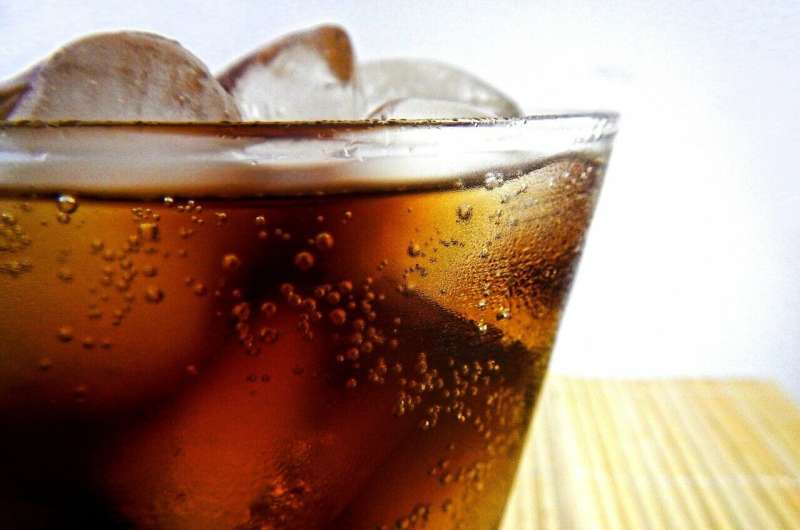This article has been reviewed according to Science X's editorial process and policies. Editors have highlighted the following attributes while ensuring the content's credibility:
fact-checked
trusted source
proofread
UK soft drink tax linked to decrease in child hospital admissions for tooth extraction

The UK soft drink industry levy introduced in 2018 may have reduced by 12% the number of children under age 18 having a tooth removed due to tooth decay, suggests research published in BMJ Nutrition, Prevention & Health.
The fall in hospital admissions may have saved more than 5,500 hospital admissions for tooth decay alone, and the largest reductions were in children aged up to nine years old.
Sugar-sweetened drinks account for around 30% of the added sugars in the diets of children aged one to three years, and over 50% by late adolescence. In England, nearly 90% of all tooth extractions in young children are due to decay, resulting in around 60,000 missed school days a year.
The World Health Organization has recommended a tax on sugar-sweetened drinks to reduce sugar consumption, which more than 50 countries have implemented.
In March 2016, the UK government announced a soft drink industry levy ("sugar tax"), which aimed to reduce sugar intake by encouraging drink manufacturers to reformulate their products. The levy was implemented in April 2018.
While the relationship between sugar-sweetened drinks and tooth decay is well established, no studies have used real-world data to examine the relationship between the levy and dental health.
To address this, the researchers analyzed hospital admissions data for tooth extractions due to tooth decay in children aged 0 to 18 years old in England from January 2014 to February 2020, four years before to almost two years after the levy was introduced. They studied trends overall as well as broken down by neighborhood deprivation and age groups.
Overall, in children aged 18 and under, there was an absolute reduction in hospital admissions of 3.7 per 100,000 population per month compared to the scenario had the soft drink levy not happened. This equated to a relative reduction of 12%.
Based on a population of nearly 13,000,000 children aged 0–18 years in England in 2020, the researchers estimated that the reduction eliminated 5,638 admissions for tooth decay.
Reductions in hospital admissions were greatest in younger children aged 0–4 years and 5–9 years, with absolute reductions of 6.5 and 3.3 per 100,000 respectively.
Dr. Nina Rogers from the Medical Research Council (MRC) Epidemiology Unit at the University of Cambridge, the study's first author, said, "This is an important finding, given that children aged five to nine are the most likely to be admitted to hospital for tooth extractions under general anesthesia."
No significant changes in admission rates for tooth decay were seen in older age groups of 10–14 years and 15–18 years. However, reductions in hospital admissions were seen in children living in most areas regardless of deprivation.
This is an observational study so causality can't be established, and the researchers acknowledge there was no comparable control group so they could not fully attribute the changes in hospital admissions to the soft drink levy.
What's more, they say other national interventions such as the sugar reduction program and compulsory nutrition labels alongside the levy may have raised public awareness of sugar consumption and influenced buying habits.
Nevertheless, they conclude that their study "provides evidence of possible benefits to children's health from the UK soft drinks industry levy beyond obesity which it was initially developed to address."
Professor David Conway, co-author and professor of dental public health at University of Glasgow, said, "Tooth extractions under general anesthesia is among the most common reasons for children to be admitted to hospital across the UK. This study shows that ambitious public health policies such as a tax on sugary drinks can impact on improving child oral health."
Professor Sumantra Ray, Executive Director of the NNEdPro Global Centre for Nutrition & Health, said, "We welcome the publication of this research, which attempts to draw the links between policy-level changes and the impact on early life oral/dental health outcomes, which—if untoward—would produce a significant onward burden on dental services through the life course."
He added, "The economic effects of this are more pronounced given current challenges in the provision of far-reaching dental health coverage both in countries with nationalized health care systems as well as others. Whilst there are methodological limitations in this study in regard to causal inference, this paper provides the basis for the design of further policy sensitive research investigating these relationships in a manner that clearly links cause and effect."
More information: Estimated impact of the UK soft drinks industry levy on childhood hospital admissions for carious tooth extractions: interrupted time series analysis, BMJ Nutrition Prevention & Health (2023). DOI: 10.1136/bmjnph-2023-000714




















